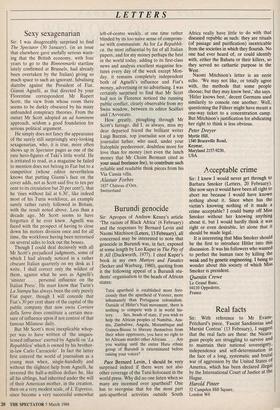LETTERS Sexy sexagenarian
Sir: I was disagreeably surprised to find The Spectator (30 January), (in an issue that elsewhere gave usefully serious warn- ing that the British economy, with four years to go to the Binnenmarkt startline lately confirmed at Brussels, had already been overtaken by the Italian) giving so much space to such an ignorant, fabulising diatribe against the President of Fiat, Gianni Agnelli, as that directed by your Florentine correspondent Mr Rupert Scott, the view from whose room there seems to be darkly obscured by his many unfounded conspiracy theories. From the outset Mr Scott adopted an ad hominern approach, seldom a good foundation for serious political argument.
He simply does not fancy the appearance of the surely still surprisingly sexy-looking sexagenarian, who, it is true, more often shows up in Spectator pages as one of the rare hero-figures of Taki's little world. He is irritated to read, in a magazine he failed to mention does not belong to Fiat but to a competitor (whose editor nevertheless knows that putting Gianni's face on the cover adds, not as Scott said five to ten per cent to its circulation but 20 per cent!), that he 'rises without fail at 6.30', like indeed most of his Turin workforce, an example surely rather rarely followed in Britain, with the result noted above. Less than a decade ago, Mr Scott seems to have forgotten if he ever knew, Agnelli was faced with the prospect of having to close down his motors division once and for all, time, the workforce having been terrorised on several sides to lock out the bosses.
Though I could deal decisively with all Mr Scott's prejudiced judgments, some of which I had already noticed in a rather obscure Italian quarterly on my desk as I write, I shall correct only the wildest of them, against what he sees as Agnelli's `sinister . . . personal influence on the Italian Press'. He must know that Turin's La Stampa has always been the only purely Fiat paper, though I will concede that Fiat's 30 per cent share of the capital of the public company that now owns Corriere della Serra does constitute a certain mea- sure of influence upon if not control of that famous Milanese daily.
But Mr Scott's most inexplicable whop- per was to have written of 'the unques- tioned influence' exerted by Agnelli on 'La Repubblica' which is owned by his brother- in-law Carlo Carraciolo'. In fact the latter first entered the world of journalism as a young man when, single-handedly and without the slightest help from Agnelli, he invested the half-a-million dollars he, like all his siblings, had inherited under the will of their American mother, in the creation, then on a very modest scale, of L'Espresso, since become a very successful somewhat left-of-centre weekly, at one time rather blinded by its too naïve sense of comprom- ise with communism. As for La Repubbli- ca, the most influential by far of all Italian papers, and for my money perhaps the best in the world today, adding to its first-class news and analysis excellent magazine fea- tures every day of the week except Mon- day, it remains completely independent both of Agnelli's influence and Fiat's money, advertising or no advertising. I was certainly surprised to find that Mr Scott had not in Florence noticed the running public conflict, clearly observable from my Swiss window, between its editor Scalfari and l'Avvocato.
How greatly, ploughing through Mr Scott's farrago, did I, as always, miss my dear departed friend the brilliant writer Luigi Barzini, top journalist son of a top journalist father, who used, under your Italophile predecessor, doubtless more for love than for money (not even the lunch money that Mr Chaim Bermant cited as your usual freelance fee), to contribute such reliable and readable think pieces from his Via Cassia villa.
Alastair Forbes
1837 Château d'Oex, Switzerland


















































 Previous page
Previous page